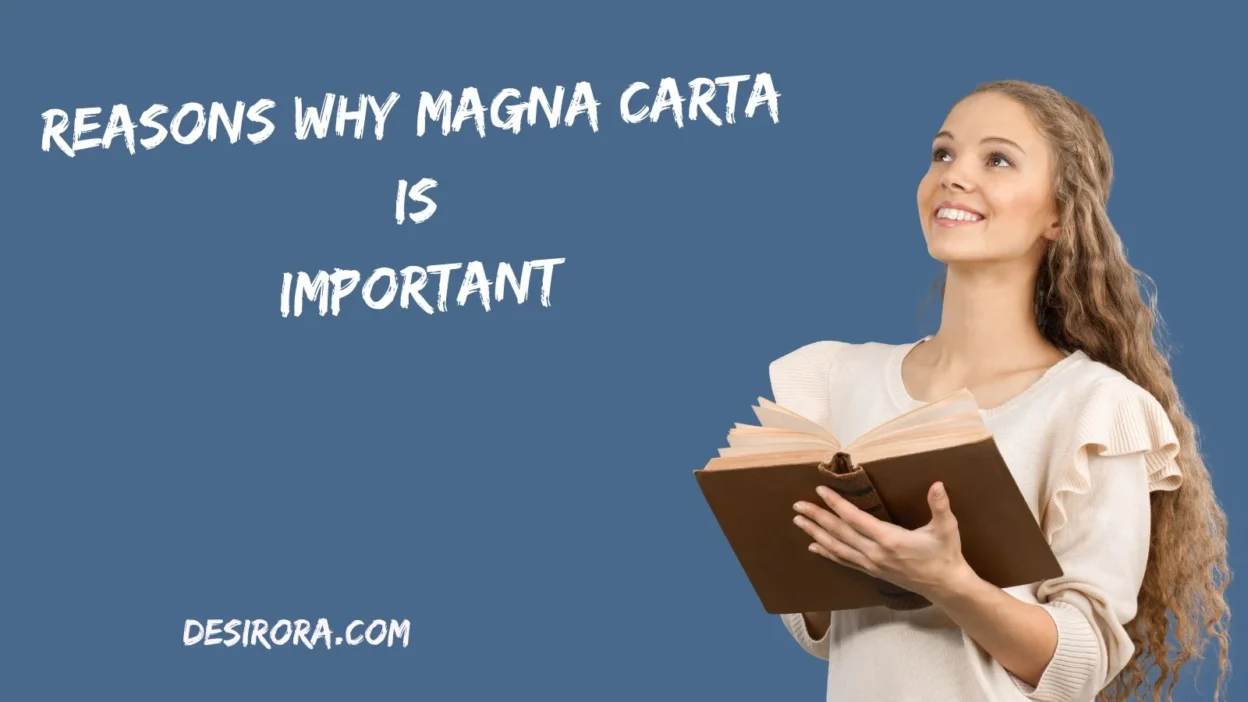The name Magna Carta often carries a weight of gravitas — it evokes centuries of legal tradition, struggle, and the idea that rulers must obey laws just as citizens do. But what makes this medieval document so important today? In this article, we’ll dive deep into why the Magna Carta matters, how it shaped legal and political systems, and how echoes of it still resonate in courts, charters, and constitutions around the world.
We’ll use a friendly tone, mix in examples and idioms, and break things down so it’s easy to read and hard to forget.
The Birth of the Magna Carta: A Story of Conflict and Compromise
To understand why Magna Carta is important, we must first travel back to early 13th-century England.
King John ruled England from 1199 to 1216. His reign was turbulent: he lost lands in France, taxed heavily, alienated his barons, and ruled by fear and force. The barons, powerful nobles, felt the king was abusing his power — seizing lands, imposing fines, and making decisions without consent.
In 1215, after a series of conflicts, the barons demanded that John accept limits on his authority. After tense negotiations at Runnymede — a meadow beside the River Thames — the “Great Charter,” or Magna Carta, was sealed by the king.
At first, Magna Carta was a peace treaty between the king and his rebellious barons, not a modern human rights document. It reflected feudal concerns — rights of nobles, property, and the Church — yet buried within it were seeds of ideas that would later grow into more universal rights.
Over time, the charter was reissued several times (in 1216, 1217, and 1225) to adapt and survive under new reigns. Though medieval in origin, its moral and legal influence endured through centuries.
Key Principles Enshrined in the Magna Carta
Magna Carta codified several ideas that were radical for its time and still resonate today. Below are some of the core principles:
| Principle | Meaning | Modern Parallel |
| Rule of Law | Even the king must obey the law | Constitutions, judicial review |
| Due Process / Lawful Judgment | No one should be punished except by lawful judgment or the law of the land | Right to a fair trial, habeas corpus |
| Limits on Taxation & Arbitrary Fines | The king cannot impose taxes or fines arbitrarily | “No taxation without representation” |
| Access to Justice | “To no one will we deny or delay right or justice.” | Equal protection, legal aid |
| Protection of Property and Inheritance | Lands and possessions must be respected | Property rights, inheritance laws |
| Free Church & Religious Authority | The Church’s rights are safeguarded | Freedom of religion |
One of the most famous clauses is Clause 39:
“No free man shall be taken, imprisoned, disseised, outlawed, banished, or in any way destroyed, nor will We proceed against or prosecute him, except by the lawful judgment of his peers or by the law of the land.”
And Clause 40 states:
“To no one will We sell, to no one will We deny or delay right or justice.”
These short but powerful lines became bedrock ideas. They spoke of fairness, limits on power, and the right to justice — concepts that now seem obvious, but were revolutionary in 1215.
Types of Rights and Protections in the Magna Carta
Although Magna Carta did not grant equal rights to everyone (it mainly protected nobles and freemen), its clauses can be grouped into categories that evolved into broader protections over time.
- Civil & Legal Protections
Example: protection against arbitrary imprisonment or punishment. - Economic / Property Rights
Example: laws ensuring inheritance rights and fair taxation. - Administrative & Local Justice
Example: ensuring local sheriffs and courts act fairly. - Rights of the Church & Religious Freedom
Example: safeguarding church independence from royal interference. - Political Consent & Power Sharing
Example: the king needing “common counsel” for taxation — an early idea of representation.
These categories laid the groundwork for modern systems of justice and government accountability. What began as baronial demands grew into the foundation of constitutional law.
Magna Carta’s Legacy: From Britain to the World
Why does a document from 1215 still matter? Because its principles traveled far beyond England’s borders and helped shape political systems worldwide.
Reaffirmations & Parliamentary Tradition
After its creation, Magna Carta was reissued under later monarchs. Over time, it became a cornerstone of English constitutional law. It inspired the growth of Parliament and the concept that rulers must rule with consent — not by divine right alone.
Influence on English Legal Reforms
Several landmark documents drew on Magna Carta’s principles:
- The Petition of Right (1628) reinforced limits on taxation without consent.
- The Habeas Corpus Act (1679) protected individuals from unlawful detention.
Each reaffirmed the same idea: power must be accountable.
Influence on the American Constitution
When American colonists resisted British rule, they looked to Magna Carta as proof that liberty and justice were ancient English rights. The U.S. Constitution and Bill of Rights echo its principles:
- The Fifth Amendment protects against deprivation of life, liberty, or property without due process.
- The Sixth Amendment guarantees fair trials — a modern echo of Clause 39.
Global Human Rights Legacy
Magna Carta is often called the spiritual ancestor of modern human rights documents like the Universal Declaration of Human Rights. Its message — that government must serve law, not stand above it — is universal.
Even today, it’s quoted by politicians, judges, and activists as a timeless reminder of fairness and accountability.
How Magna Carta Influences Modern Law and Society
“Why Magna Carta is important” isn’t just a question of history — it’s a matter of living law.
Constitutional Foundations
Many countries include principles of due process, equality before the law, and fair trials in their constitutions — direct descendants of Magna Carta’s legacy.
In England and Wales, a few clauses technically remain in force today, such as the right to justice without delay and the Church’s freedom from state interference.
Courts and Case Law
Courts worldwide often reference Magna Carta when interpreting laws about liberty, fairness, or judicial authority. Even if not legally binding, its moral authority strengthens the principle that no one — not even the state — is above the law.
Civil Rights Movements
Activists have invoked Magna Carta to justify protests against injustice. Its message fuels debates on human rights, surveillance laws, and state overreach.
Education and Civic Awareness
Magna Carta is taught in schools not as a relic, but as a living symbol of justice. It helps young people understand how freedoms developed over time — and why protecting them matters.
Criticisms, Myths, and Misinterpretations
With great fame comes great misunderstanding. Let’s clear up some myths about Magna Carta.
Myth: Magna Carta gave everyone equal rights
Not true. In 1215, only a small segment of society — the nobility and freemen — benefited. Most people were peasants or serfs and had no voice in it.
Myth: It instantly created democracy
Magna Carta didn’t invent democracy. It started a long process that would, centuries later, lead to parliaments, constitutions, and the vote.
Myth: All clauses still apply today
Of the original 63 clauses, most have been repealed or replaced. Only a handful survive — mainly those about justice and church freedom.
Criticism: It was more symbolic than effective
In truth, the original Magna Carta was annulled soon after it was signed. But its reissues and reinterpretations gave it lasting power. It evolved from a peace treaty into a moral foundation of liberty.
Myth: It was unique
Other societies had legal traditions that limited rulers, but Magna Carta became famous because it was written, sealed, and remembered — and because later generations kept it alive.
Real-Life Examples: Magna Carta in Action Today
To understand why Magna Carta is still relevant, let’s look at some modern examples.
- Fair Trials – Whenever someone accused of a crime is given legal representation and a fair hearing, Magna Carta’s principle of lawful judgment is at work.
- Protection from Arbitrary Detention – Laws limiting detention without charge are inspired by Clause 39.
- Checks on Excessive Fines – Modern courts sometimes strike down unfair penalties — another echo of the Great Charter.
- Judicial Review – When courts declare government actions unlawful, they follow Magna Carta’s core belief: that no one is above the law.
- Public Protests and Rights Claims – Activists still quote Magna Carta when defending free speech and fairness.
Even in the digital age, the idea that government must act under law — not over it — is Magna Carta’s enduring legacy.
Grammar Corner: “Magna Carta” vs “the Magna Carta” & Synonyms
Let’s pause for a quick linguistic note.
Should you say Magna Carta or the Magna Carta?
Both are correct. Magna Carta means “Great Charter” in Latin, so technically it doesn’t need “the.” However, most modern writers say “the Magna Carta” for clarity.
Examples:
- Correct: Magna Carta established a precedent for justice.
- Also correct: The Magna Carta remains a symbol of liberty.
Synonyms & Related Terms
| Synonym / Related Term | Meaning / Usage |
| Great Charter | Literal translation; often used in historical writing |
| Charter of Liberties | Descriptive, emphasizing rights |
| Liberties Charter | Poetic variation |
| Rule of Law Charter | Highlights legal limits |
| Foundational Legal Charter | Broader, modern phrasing |
FAQs
Q1: Why is Magna Carta still taught in schools?
Because it’s more than an ancient document — it’s a foundation for modern ideas of law, liberty, and fairness.
Q2: Does Magna Carta protect people today?
Only a few clauses remain active, but its principles live on in modern constitutions and human rights laws.
Q3: Was Magna Carta the first document to limit royal power?
No, but it was the first to do so formally and in writing, inspiring centuries of reform.
Q4: Which parts are still valid today?
Only three clauses remain in British law: freedom of the Church, rights of the City of London, and the promise that justice won’t be denied or delayed.
Q5: Why is it relevant to other countries?
Because its message — that rulers must follow laws — became a universal idea shaping democracies and legal systems worldwide.
Conclusion
Magna Carta’s importance lies not in the number of its clauses, but in the timeless power of its message. It turned the idea of absolute power into one of accountable rule. It taught societies that justice, fairness, and the rule of law are not privileges — they are rights.
Though written over 800 years ago, its echoes are heard in every courtroom, constitution, and declaration of freedom around the world.
That’s why Magna Carta isn’t just a historical document — it’s a living reminder that liberty must always have a voice, even when power forgets to listen.




